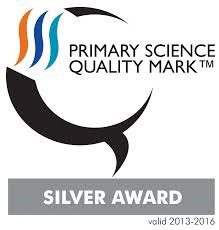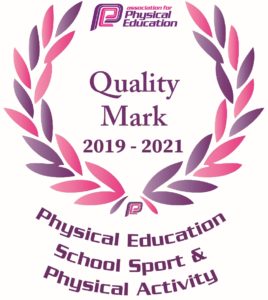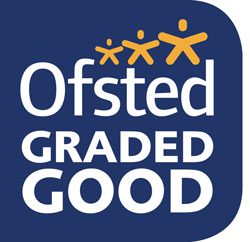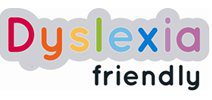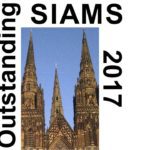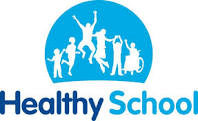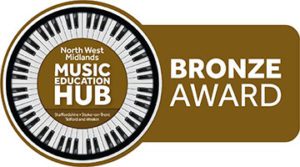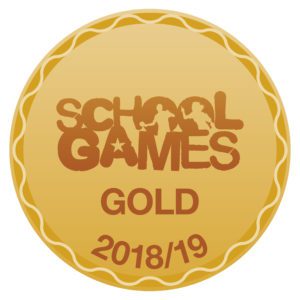Welcome to Early Years Foundation Stage
Welcome to the Early Years class page. Here you can find out about what we are learning, our daily routines, important events and see what Early Years is all about.
Here at Waterhouses, the staff and children are really proud of our Early Years Foundation Stage and love coming to school to learn. We hope you enjoy finding out about our Nursery and Reception class which is called Ladybirds class.
Our Nursery offers both 15 and 30 hours provision. All parents are entitled to 15 hours free provision the term after your child has turned three.
30 hours provision is free for parents who are eligible – check www.gov.uk to find out if you may be eligible.
Meet the staff:
Mrs J. Hulme – Early Years lead and class teacher
“Hello! I’m Mrs Hulme and I love early years teaching; it has been my passion for many years.
Waterhouses is a small school set in the beautiful Staffordshire Moorlands, and I have responsibility for Nursery, Reception, Safeguarding, PSHE and RSE, RE and looked after children. I am busy at school, but I always prioritise the children both in Ladybirds’ class and in school. Over my years as a teacher I have learnt that relationships are the key to effective teaching and learning and I work hard to nurture my relationships with the children and families. We have a fantastic team in Early Years, who go above and beyond to unlock the potential of each and every child.”
Mrs A. Bradbury – HLTA
Mrs L. Salt and Mrs J.Boyington – part time TA’s
What makes Early Years different?
The Early Years is about how children learn, as well as what they learn. Children are given opportunities to develop their own play and independent exploration. They are encouraged to think, discuss and plan ahead so that their learning is enjoyable and motivating.
There are seven areas of learning which are covered:
- Communication and language,
- Physical development
- Personal, social and emotional development
- Literacy
- Mathematics
- Understanding the world
- Expressive arts and design
Writing in Early Years:
Our English curriculum exposes the children to a range of high-quality texts through both reading and writing.
The teaching of writing begins as soon as children enter school, and their skills are developed from emergent/developmental writing with opportunities for writing in structured and play based activities. We provide a rich, challenging and stimulating environment for experimental and emergent writing.
In order to write children need to:
- Make marks using a range of different material and have their marks valued
- Understand that print carries meaning and ascribe meaning to their marks
- Develop gross motor and then fine motor skills to support recognisable letters
- See adults write and explain the writing process
- Be able to say the sentence they want to write
- Have a purpose for their writing
- Have a “can do” attitude towards writing
- Be immersed in a language rich environment
- Be read to on a daily basis
- Understand the link between reading, writing and phonics
- Be able to segment words to spell them

Reading in Early Years:
Reading is such an important life skill, and we want all children to develop a love reading. Reading is all about sharing books together – this can be through hearing your child read as well as reading to them, talking about books and allowing children to develop their vocabulary stamina and knowledge around them.
At Waterhouses we give all children a strong foundation with reading to enable them to develop a secure ability to read confidently and fluently for pleasure. We follow Little Wandle for our phonics scheme.
From the beginning of school in Nursery staff teach the foundations for phonics which develops children’s phonological and phonemic awareness through fun, engaging games and nursery rhymes. Developing these skills in Nursery lays the best possible foundations for learning phonics in Reception.
In Reception, children are taught to read individual sounds, blending and decoding these within simple words. Following this, moving onto digraphs and trigraphs and learning the corresponding graphemes for each, using these skills to apply to reading a wide range of texts and building comprehension skills. Phonics lessons are taught daily, and children are regularly monitored and assessed to ensure all children make good progress.
Children will each have a phonics related book that is suited to their corresponding level and these books are firstly shared in class and are then sent home.
Below are some of the example texts that we will be sharing and exploring this year:
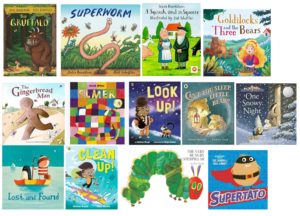
Children have a daily story time with stories, non-fiction books, rhymes and songs.
Maths in Early Years:
Staff in the Early Years, use Development Matters, the Early Learning Goals (ELG) and White Rose Maths to guide maths planning. In the Early Years Foundation Stage, we aim for pupils to build on their own experiences and pupils are encouraged to gain a conceptual understanding of maths through the use of practical, concrete equipment such as Numicon. The White Rose schemes have number at the heart and a lot of time is spent reinforcing number to build competency. It also provides opportunities to build reasoning and problem solving into learning.

Continuous provision:
Children explore different areas of provision within the indoor and outdoor environment. (E.g., writing, maths, water, sand, dough, creative, construction)
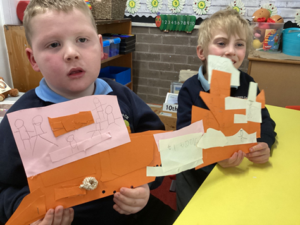
Adults support the children in their independent learning through questioning, talking and making suggestions. Observations of how and what the children learn are taken for their learning journeys which is accessed through Tapestry an online learning journal which is our way of documenting your child’s experiences and development throughout Ladybirds class.
As well as helping teachers keep track of each child’s progress, they can be an excellent way of keeping families and the children themselves involved in their learning and parents can add their own observations from home.
Ladybirds Knowledge Organiser Spring 2 2026
Knowledge Organiser Spring 1 2026
Autumn 2 2025 Knowledge Organiser
Knowledge Organiser Ladybirds Sept 25

